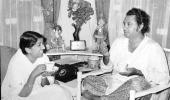
Javed Akhtar says he has to write Hindi dialogues in the Roman script for the new generation of actors today because 'they can't read anything else'.
The 79-year-old poet was speaking at a session titled Hindi & Urdu: Siamese Twins, held on Thursday, January 11, 2024, at the India International Centre in New Delhi.
"In the film industry, we write (Hindi) dialogues in Roman (English script) for most of the new crop of actors today. They can't read anything else," Akhtar told a packed house at the C D Deshmukh auditorium.
The industry veteran, who was in conversation with Professor Alok Rai, said language belongs to a region and has nothing to do with religion.
"It's been about 200 years since the separation of Hindi and Urdu was accepted by the authorities. But they were always one. The Bengalis of the erstwhile East Pakistan said, 'We'll die but not study Urdu, we want another country (Bangladesh).' Who were these 10 crore people, did they speak Urdu?
"Do the Arabs in the Middle East speak Urdu? Urdu is the language of only the Indian subcontinent. This has nothing to do with religion. You go and tell people of Tamil Nadu that Hindi is the language of Hindus, see what happens then," he added.
Akhtar advocated that there is a need for a dictionary of Hindustani words.
"You can't speak any Urdu phrase without using Hindi terms. The syntax is the same, 90 per cent vocabulary is the same. Why can't some of us scholars, writers and researchers put together a common dictionary in the forgotten language which we call Hindustani? A dictionary with some of the excellent words of the both languages Hindi and Urdu in one place. Imagine how rich our vocabulary will be!"
Akhtar, one-half of the successful screenwriter duo Salim-Javed and a lyricist, said as a film writer, he knows when to use a word of Hindi or Urdu.
"That's because I'm writing Hindustani for Hindustanis (Indians). I'm not writing for Urdu wallahs and Hindi wallahs. I'm writing for Hindustanis. The day Hindustanis develop an interest, the language will automatically become fine."
Language, culture, values, and aesthetics are 'dynamic in nature', said Akhtar, adding they would die if they became stagnant.
"A river will keep expanding if it keeps including other streams into it. What will you keep removing from culture? It's not possible because a day will come when someone will say that what is left is also from outside and not needed."
Citing the example of Pakistan's formation on the basis of the two-nation theory, he quipped: "The ones who removed something are right here, our neighbours, look at them. They wanted to be pure, the name of their very country is 'Pak'. It's for everyone to see how 'pak' (pure) they have become. If you think they are right, you also become 'pak'."
For people related to the field of communication, including the film industry, there is no concept of pure Urdu or pure Hindi, explained Akhtar using an onion analogy.
"You take an onion and start peeling off its layers with the aim of finding where the real onion is. The onion lies in the peels. That's how words keep getting included in the language from different sources and the language keeps getting richer," he said.
The session, which ran for over two hours, also veered towards ghazals.
Akhtar said he considers Raghupati Sahay aka Firaaq Gorakhpuri as the greatest poet of ghazals, after Mir Taqi Mir and Mirza Ghalib.
"Once Amitabh Bachchan asked me, 'Why are you such a big fan of Firaaq?' I told him, 'Since you are an actor, I'll share this with you.' Firaaq and his poet-father Harivansh Rai Bachchan were close because of their Allahabad connection.
"I told him (Amitabh Bachchan) that I can give you several examples of Firaaq's shers that if you read them with correct expressions, you'll think I haven't given these expressions in any of my films. That's because the way he wrote those shers, no other writer can capture that mood," he recalled.
Except former vice-president of India Hamid Ansari, who was sitting in the audience, Akhtar said he had never heard any political leader recite a sher correctly.
"I've been here for such a long time but I've never heard any political leader from any party recite a sher correctly. They recite them invariably wrong. Aur iss maamle mein sab ek jhande ke neeche hain (In that manner, all of them belong to the same party)" he said.
Last year, the Delhi police issued a circular asking the police personnel to avoid using complex Urdu/Persian words such as 'zakhm', 'hidaayat', 'mujrim' and 'bayaan'.
Akhtar read out a few words from the circular which lists a total of 383 common Urdu/Persian words/phrases and took a swipe at the authorities for doing a bad job with their translation into simple Hindi/English words.
"If you have to simplify the language, find some people who know it. If there's something I can do, let me know. I'd be happy to help. This list has many wrong words in it."











